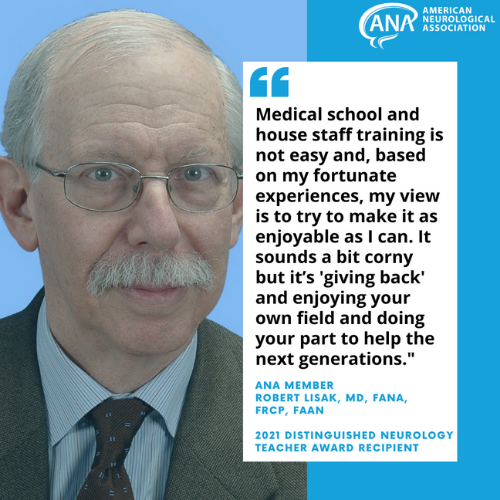This month, the ANA talks with the recipient of the 2021 Distinguished Neurology Teacher Award, Robert Lisak, MD, FRCP, FAAN, FANA. Dr. Lisak is the Parker Webber Chair in Neurology, Professor of Neurology and of Biochemistry, Microbiology and Immunology at Wayne State University. He was a member of the Department of Neurology at Penn for 15 years, including two years as Vice-Chair, before moving to WSU where he was Chair of Neurology for 25 years, and continues as a faculty member.
What notable experiences have shaped your career as an educator?
I don't think there was any one experience or even a few notable experiences. I was fortunate to have inspiring teachers in high school, Erasmus Hall, when the NYC public school system was outstanding, and you didn't need to attend a magnet school to get a great education and be taught by great teachers. I had terrific teachers and mentors in college at the College of Arts and Sciences at NYU and in medical school at the College of Physicians & Surgeons at Columbia University and several became mentors - they clearly enjoyed teaching and wanted me to succeed and enjoy learning.
I was also very fortunate during my training in internal Medicine at Montefiore and Einstein, at NIH/NIMH and during my residency in Neurology, and as a trainee/fellow in Allergy and Immunology (as it was then called) to have several mentors. And they clearly went out of their way to see that you learned and that you enjoyed learning. They enjoyed when you did well. There is a word in Yiddish, kvelling - bursting with pride, that you could see in them at your achievements. I get that sensation when I see accomplishments of former and current students, residents, and fellows.
I also had some ineffective teachers – often due to their style and approach to teaching – and they served as examples of how not to teach.
Medical school and house staff training is not easy and based on my fortunate experiences my view is to try to make as enjoyable as I can. It sounds a bit corny but it’s “giving back” and enjoying your own field and doing your part to help the next generations.
What changes have you seen in neurology education and what are your predictions for the future of the field?
There have been both good things like the ability to bring more science into clinical care, our understanding of disease pathogenesis and of treatment, but we have a way to go. I think the growth of technology particularly imaging and laboratory testing including genetic and molecular testing, but also clinical neurophysiology, has been important in education. However, this has been a two-edged sword. I am not happy with the de-emphasis on a careful detailed history and downgrading of the neurologic exam and perhaps an overreliance on technology. I also think overreliance on symptom triggering workups at the expense of the correct diagnosis is a problem. Osler would not be pleased. And ordering panels without really understanding what is included in the panels and how to interpret them is not a good trend. It's the way they need to be ordered in the EMR for different coding reasons, but you need to think about the clinical and the biology in your evaluation. “CSF MS panel” is a term that would best if banished from notes and presentations.
If we keep the balance and use what is new without shortchanging what was and still is useful from the past, then I'm cautiously optimistic about the future of neurology education.
What does earning the Distinguished Neurology Teacher Award mean to you?
I view teaching as one of the most important things I do in my work. I've been doing this as a faculty member since July of 1972. You don't teach or do research and other scholarly activity to win awards. But it is heartwarming to know what you've done is appreciated and it means you have probably accomplished your mission. And by teaching you are continuing to learn. That's critical to remember.
How has the ANA supported your career and/or work?
I've been a member of the ANA for many years – I think I was one of the first two people under 40 years old elected to membership. The Annual Meetings, the learning at meetings, and learning while on the editorial board of the Annals of Neurology, serving on the Executive Committee, the program committee, those are service but also learning opportunities for those who are serving. And the friendships with colleagues have been very important.
Anything else you'd like to add?
Just to say this is one of the highest, most meaningful, and important awards in my career in medicine.

